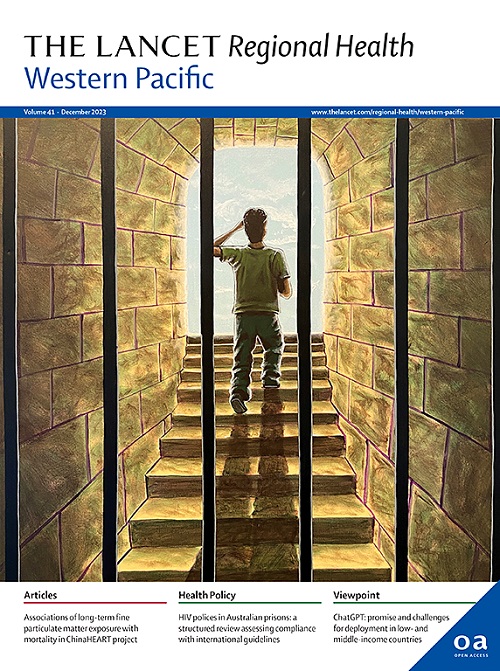心理健康素养与中国精神疾病患者的污名化和歧视:范围审查
IF 8.1
1区 医学
Q1 HEALTH CARE SCIENCES & SERVICES
引用次数: 0
摘要
低心理健康素养(MHL)可能导致对精神疾病的误解,并加强各种形式的耻辱(公共的、个人的和联想的),导致歧视,减少寻求帮助和更差的心理健康结果。为了总结关于MHL、病耻感和歧视的文献现状,本综述确定了2000年至2024年在5个英文数据库和3个中文数据库中发表的387篇研究:60.7%关注病耻感,31.8%关注MHL,只有7.5%关注歧视。大多数研究(84.8%)为描述性横断面研究,14.5%为评估干预措施,0.7%为非干预性纵向研究。方法学质量普遍较低:约88.4%的横断面研究、75.6%的随机对照试验和83.4%的准实验研究报告缺乏对关键方法学或统计学细节的描述。在排除仅在一项研究中报告的研究人员开发的工具后,还剩下125种评估工具,其中26.4%是中国开发的。虽然研究了21种不同的心理健康状况,但91.0%的研究集中在一种状况上。研究地点在地理上是倾斜的(三分之一的研究在广东、北京和上海进行),研究参与者不具有目标队列的代表性。2010年后,论文发表数量大幅增加。56项主要采用心理教育干预的干预研究中,大多数报告了MHL的改善和病耻感的减少。对未来研究的建议包括:1)开发标准化工具以提高可比性。2)确保详细的统计分析和明确的样本特征。3)评估不同精神健康状况下MHL、污名化和歧视的差异。4)加大对欠发达地区的研究力度,开展全国性的纵向研究。5)在干预研究中纳入更广泛的参与者,并考虑新的干预策略(即,除心理教育干预外)。6)使研究目标与国家精神卫生政策保持一致,以增强其相关性和影响力。本文章由计算机程序翻译,如有差异,请以英文原文为准。
Mental health literacy and the stigmatisation and discrimination of individuals affected by mental illnesses in China: a scoping review
Low mental health literacy (MHL) could contribute to misconceptions about mental illnesses and reinforce various forms of stigma (public, personal, and associative), leading to discrimination, reduced help-seeking, and poorer mental health outcomes. To summarise the current state of the literature on MHL, stigma, and discrimination, this scoping review identified 387 studies published from 2000 to 2024 in five English and three Chinese databases: 60.7% focused on stigma, 31.8% on MHL, and only 7.5% on discrimination. Most studies (84.8%) were descriptive cross-sectional studies, 14.5% evaluated interventions, and 0.7% were non-intervention longitudinal studies. Methodological quality was generally low: reports about 88.4% of the cross-sectional studies, 75.6% of the randomised controlled trials, and 83.4% of the quasi-experimental studies lacked descriptions of key methodological or statistical details. After excluding researcher-developed tools only reported in a single study, 125 assessment tools remained, 26.4% of which were developed in China. Although 21 different mental health conditions were studied, 91.0% of the studies focused on a single condition. Study locations were geographically skewed (one-third of all studies were conducted in Guangdong, Beijing, and Shanghai), and study participants were not representative of the target cohort. The number of publications increased substantially after 2010. Most of the 56 intervention studies, which primarily used psychoeducational interventions, reported improved MHL and decreased stigma. Recommendations for future studies include: 1) Develop standardised instruments to improve comparability. 2) Ensure detailed statistical analyses and clearly defined sample characteristics. 3) Assess variations in MHL, stigmatisation, and discrimination across different mental health conditions. 4) Increase research in underserved regions and conduct nationwide longitudinal studies. 5) Include a broader range of participants in intervention studies and consider new intervention strategies (i.e., other than psychoeducation interventions). 6) Align research objectives with national mental health policies to enhance their relevance and impact.
求助全文
通过发布文献求助,成功后即可免费获取论文全文。
去求助
来源期刊

The Lancet Regional Health: Western Pacific
Medicine-Pediatrics, Perinatology and Child Health
CiteScore
8.80
自引率
2.80%
发文量
305
审稿时长
11 weeks
期刊介绍:
The Lancet Regional Health – Western Pacific, a gold open access journal, is an integral part of The Lancet's global initiative advocating for healthcare quality and access worldwide. It aims to advance clinical practice and health policy in the Western Pacific region, contributing to enhanced health outcomes. The journal publishes high-quality original research shedding light on clinical practice and health policy in the region. It also includes reviews, commentaries, and opinion pieces covering diverse regional health topics, such as infectious diseases, non-communicable diseases, child and adolescent health, maternal and reproductive health, aging health, mental health, the health workforce and systems, and health policy.
 求助内容:
求助内容: 应助结果提醒方式:
应助结果提醒方式:


